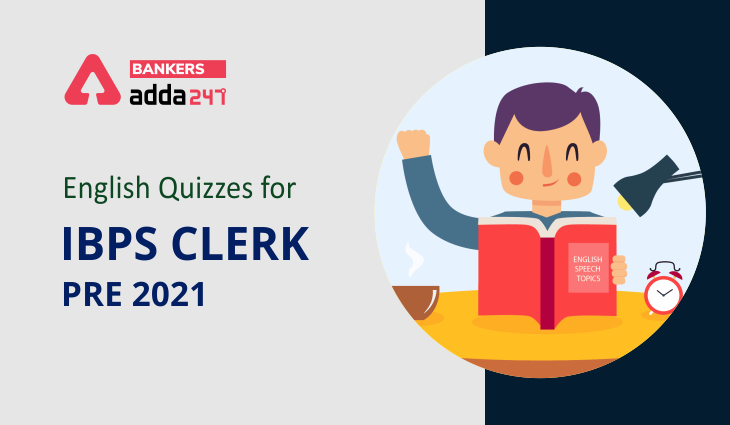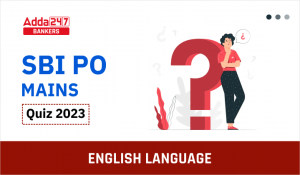
TOPIC: Reading Comprehension
Directions (1-10): Read the following passage carefully and
answer the questions given below it. Certain words are given in bold to help
you locate them while answering some of the questions.
Some
people shy away from travelling alone, a few embrace it. So, what is it that makes it an attractive option? What
are the advantages of going it alone?Well first things first, travelling solo
can be very liberating. The itinerary you set and all the decisions you make
are yours and yours alone. You don’t need to worry about any other person or
group. In other words, there’s no need to compromise, there are no arguments,
and no need to second-guess what other people want or need. Actually, you can be completely selfish.
Travelling alone is also a great confidence builder. Yes, at times it can feel
a bit lonely, but that is just one of many problems you will have to solve
yourself, along with making your own arrangements, and setting your own goals.
Have
you noticed that when you’re on your own, people are more willing to start a
conversation with you? You’re more likely to take the initiative as well, and
before you know it, up pops an invitation for a meal, a side trip, a stay at
someone’s home. For some odd reason people keep a slight distance from couples
and groups, probably because they seem so self-contained and exclusive. Whereas
the lone traveller looks ready to connect with their fellow human beings, and
more likely to engage in pleasant conversation and simple exchanges about their
travels. Putting it simply, lone travellers look interesting.
Here
are two more exciting reasons why you should consider travelling solo: You will
find you learn language faster when you don’t have someone else talking to you
in your own language all the time. It’s funny, but we interact, are forced to
interact much more frequently when we travel alone in a country that doesn’t
speak our native tongue. If that doesn’t convince
you, there is the chance for adventure and even romance. When you’re on your
own you’re free to meet someone who might turn out to be very important in your
life. The most important factor to consider in your decision to make a trip
alone is your own sense of independence. If you find that you have little
tolerance for the idiosyncracies of
others, or you don’t get how group dynamics work, you might be happier
travelling alone. Of course, there may be things holding you back: Fear of the
unknown, or maybe you have a spouse, relative, or friend who may be upset by
your decision to take off by yourself, you will have to convince them of the
value of travelling alone and allay
any fears they might have, but with the technology at our fingertips, you can
include them in the adventure.
Q1.
According to the passage, what kind of people likes to travel alone?
(a) who
is not well versed in communicating with others.
(b) who cannot adjust with the behavior and thoughts of other people.
(c) who is introvert.
(d) who doesn’t like to share their things with others.
(e) All of the above
Q2.
What is/ are the demerit (s) of traveling alone?
(a) We
need to solve the problems with ourselves.
(b) We need to be dependent on unknown people for various things
(c) Sometimes we can feel lonely.
(d) Both (b) and (c) are correct
(e) All
of the above.
Q3.
What are the things that restrict us to travel alone?
(I) Relatives or spouse not allowing to travel
alone.
(II)
The fear of unknown people might restrict us.
(III) not finding a reason to travel alone
(a)
Only (I)
(b) Only (II)
(c) Both (I) and (II)
(d) Both (II) and (III)
(e) All are correct
Q4.
What is / are the exhilarating reasons of
travelling alone?
(a) You
need not to be dependent on others for any sort of work.
(b) You will get to learn the others language.
(c) By travelling alone we are free to know a person that might become a
special part of our life.
(d) You
are free to do anything at any time while travelling alone.
(e) Both (c) and (d)
Q5.
What are the advantages of travelling alone?
(I)
Make our connections strong with other people along the journey
(II) We can selfishly make our own decisions.
(III) Great confidence builder
(a)
Only (I)
(b) Only (II)
(c) Both (I) and (II)
(d) Both (II) and (III)
(e) All are correct
Q6.
Choose the most appropriate title of the passage.
(a)
Merits and demerits of travelling alone
(b) Travelling alone
(c) Is Travelling alone right?
(d)
Travelling alone brings Independence
(e) Technology at our finger tips
Directions (7 –
8): Choose the word which is most nearly the same in meaning to the word given in bold as used in the
passage.
Q7.
Allay
(a)
dispel
(b) edict
(c) emulate
(d) mollify
(e) exhort
Q8.
Idiosyncracies
(a)
exigent
(b) collate
(c) refute
(d) evince
(e) peculiarity
Directions
(9-10): Choose
the word which is opposite in meaning to the word given in bold
as used in the passage.
Q9. Embrace
(a)
disparate
(b) atrophy
(c) repudiate
(d) bane
(e)
persuade
Q10.
Convince
(a)
capitulate
(b) dissuade
(c) bereft
(d) beguile
(e) callous
Directions (11-15): Read each sentence to find out whether there
is any grammatical or idiomatic error in it. The error, if any, will be in one
part of the sentence. The number of that part is the answer. If there is ‘No
error’, the answer is (e)). (Ignore errors of punctuation, if any.)
Q11. (a) Women riding pillion on two-wheelers / (b)
in the capital have to compulsorily / (c) wear helmets, according to the
final notification / (d) issued by Delhi government. / (e) No
error
Q12. (a) Arun Jaitley’s life has been full of dramatic
loops, / (b) sudden upswings and a few downturn, / (c) till
finally he’s arrived at a job that / (d) has him at the helm of the
nation’s economic affairs. / (e) No error
Q13.(a) Since the commencement of the Constitution in
1950, / (b) it is for the third time that governors —this time / (c)
as much as nine — have had to go / (d) following a change of guard at
the Centre. / (e) No error
Q14. (a) The declaring of a long-term ceasefire / (b)
between Israel and Hamas, after 50 days of off-again, on-again fighting, / (c)
has brought immediate relief to both sides / (d) of the border between
Israel and the Gaza Strip. / (e) No error
Q15. (a) Lawmaking is the routine business / (b)
of government, and / (c) reviewing for possible repeal / (d)
should also happen routinely. / (e) No error
ALSO CHECK:
S1.
Ans.(b)
Sol.
Refer the third paragraph “If you find that you have little tolerance for the
idiosyncracies of others, or you don’t get how group dynamics work, you might
be happier travelling alone.”
S2.
Ans.(c)
Sol.
Refer the last lines of first paragraph of the passage which gives the exact
explanation that sometimes we can feel lonely while travelling alone unless you
can solve it yourself.
S3.
Ans.(c)
Sol.
Refer the last paragraph of the passage “Fear of the unknown, or maybe you have
a spouse, relative, or friend who may be upset by your decision to take off by
yourself”.
S4.
Ans.(e)
Sol.
Refer the first few lines of third paragraph.
S5.
Ans.(d)
Sol.
Both sentences (II) and (III) are correct. Refer the first paragraph.
S6.
Ans.(b)
Sol.
“Travelling alone” is the appropriate title of the passage as the whole passage
revolves around this theme.
S7.
Ans.(d)
Sol.
Allay means to reduce. Hence it has same meaning as mollify.
Emulate
means match or surpass (a person or achievement), typically by imitation.
S8.
Ans.(e)
Sol.
Idiosyncracies means a mode of behaviour or way of thought peculiar to an
individual. Hence it has same meaning as peculiarity.
Refute
means prove (a statement or theory) to be wrong or false, disprove.
Collate
means collect and combine.
Exigent
means pressing, demanding.
S9.
Ans.(c)
Sol.
Embrace means accept (a belief, theory, or change) willingly and
enthusiastically. Hence it has opposite meaning to repudiate.
Disparate
means essentially different in kind, not able to be compared.
Atrophy
means waste.
S10.
Ans.(b)
Sol.
Convince means cause (someone) to believe firmly in the truth of something. Hence
it has opposite meaning as dissuade.
Callous
means showing or having an insensitive and cruel disregard for others.
Sol.
Insert
‘the’ before ‘Delhi’.
S12. Ans.(e)
Sol. No error.
S13. Ans.(c)
Sol. Replace ‘much’ with ‘many’
S14. Ans.(a)
Sol.
Replace
‘declaring’ with ‘declaration’
S15. Ans.(c)
Sol. Replace ‘reviewing’ with ‘review’




 English Quizzes For SBI PO Mains 2023 - ...
English Quizzes For SBI PO Mains 2023 - ...










